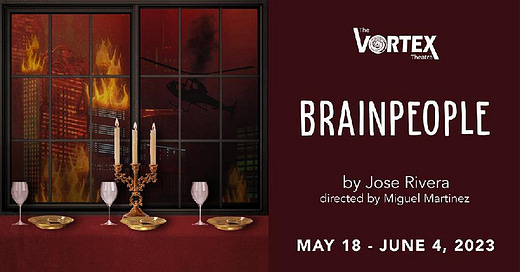On May 18th, a week from today, a short run of playwright Jose Rivera’s Brainpeople will open at Albuquerque, New Mexico’s Vortex Theatre, under the direction of my friend, longtime collaborator and mentor Miguel Martinez. Miguel asked me to provide a program note about the work and about Rivera, which I was happy to do.
I realized, while writing the note, that Rivera has become a prophetic writer. Of Puerto Rican heritage and from a deeply religious family fraught with apocalyptic anxiety, Rivera has turned time and again to themes of societal collapse and militarism. His play Marisol is about a young woman in the Bronx trapped between a war of angels. In Brainpeople a wealthy Manhattanite throws an ominous dinner party while dangerous militias prowl that streets
As The Middlebrow worked on the program note there were two shootings, separated by pretty vast geographic and cultural distance. In one, a boy was shot by a homeowner for ringing the wrong doorbell. In another, a couple were shot for pulling into the wrong driveway.
I added these events to my understanding of Rivera’s America, which always seems to be teetering into a war-mentality. Since then, as Miguel and his cast round out their rehearsal process, an incident on New York City’s subway, at a stop nearby to the Middlebrow Co-Op, has earned national attention. Jordan Neeley was killed by Marine veteran Daniel Penny. Penny says he was defending himself and others against a homeless person who had lost control of himself and was threatening those around him. Now, he’s being charged with second degree manslaughter and his trial will turn into a referendum on public safety in New York City, what we should expect from the police and what individual citizens can do when the police fail.
I’ll also add, without trying to sway too far into politics, that ideas like truly free and universal holistic healthcare, universal basic income and a right to safe housing could also prevent things like this from happening. Just saying. It’s not everybody’s vision for society and I also respect that.
The Middlebrow isn’t a place to adjudicate matters, but it is a place to talk about the trends that define modern living and it does seem that there is a significant minority of people in America who live with a war mentality, who have armed themselves, who have trained themselves to fight and who are willing to commit violence if they perceive it is in their self-defense. They also seem quite willing to feel attacked.
In Brainpeople the militias are off stage — a menacing presence from the outside. We do not see them in action, we know them through the fear of the characters we do meet and for their desire to get out, to get anywhere.
People are living like this and they are shooting at cars and shooting children. Blame the guns, if you will, as it might be a way to address the issues (though our political system and climate make it impractical and unlikely), but are we talking enough about the mindset, here? The guns are an expression of the psychology and though their presence reinforces it, I don’t think you can call them the driver.
Empathy is a primary function of art. James Baldwin described the value of fiction as showing the reader that all of the desires, fears and anxieties that we think are unique to us are shared by all of us and that can help us find peace and common ground.
But, maybe Baldwin cuts both ways — maybe people do look inside themselves and what they see, and project onto others, is nasty, violent and can’t be trusted. So they lurk in their homes, armed and waiting, or walk among us, spoiling to fight.
We are not an introspective society, to say the least. But there is something going on that we collectively need to answer for, as people are dying and Rivera’s plays look more and more like descriptions than imaginings every day.


